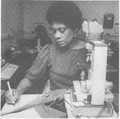Cytotechnology
Cytotechnology is a specialized field in the medical laboratory sciences, focusing on the study of cells in disease. It involves the microscopic interpretation of cells to detect cancer and other abnormalities.
Overview[edit]
Cytotechnologists are trained to notice subtle changes and abnormalities in cells, which can be critical in early detection of cancer. They examine cell samples from various body sites, such as the lungs, bladder, and female reproductive system, under a microscope. The primary responsibility of a cytotechnologist is to determine whether a sample is normal, abnormal (but non-cancerous), or malignant.
Education and Training[edit]
To become a cytotechnologist, one must complete a Bachelor's degree in cytotechnology or a related field. This is followed by a specialized post-baccalaureate program in cytotechnology, which includes both classroom instruction and clinical training. After completing their education, cytotechnologists must pass a national certification exam administered by the American Society for Clinical Pathology (ASCP).
Role in Healthcare[edit]
Cytotechnologists play a crucial role in healthcare by providing valuable information to physicians for patient diagnosis and treatment. They work closely with pathologists, who make the final diagnosis. Cytotechnologists also play a role in fine needle aspiration (FNA) procedures, where they prepare and assess the adequacy of the sample on-site.
Techniques[edit]
Cytotechnologists use a variety of techniques to prepare and examine cell samples. These include cytospin preparation, monolayer technique, and immunocytochemistry. They also use computer-assisted screening and imaging technologies to aid in the detection of abnormalities.
Challenges and Future Directions[edit]
The field of cytotechnology is constantly evolving with advancements in technology and changes in healthcare delivery. Cytotechnologists must stay updated with the latest techniques and guidelines. The future of cytotechnology lies in molecular diagnostics, personalized medicine, and digital pathology.
-
Cytotechnology
Ad. Transform your life with W8MD's Budget GLP-1 injections from $75


W8MD offers a medical weight loss program to lose weight in Philadelphia. Our physician-supervised medical weight loss provides:
- Weight loss injections in NYC (generic and brand names):
- Zepbound / Mounjaro, Wegovy / Ozempic, Saxenda
- Most insurances accepted or discounted self-pay rates. We will obtain insurance prior authorizations if needed.
- Generic GLP1 weight loss injections from $75 for the starting dose.
- Also offer prescription weight loss medications including Phentermine, Qsymia, Diethylpropion, Contrave etc.
NYC weight loss doctor appointmentsNYC weight loss doctor appointments
Start your NYC weight loss journey today at our NYC medical weight loss and Philadelphia medical weight loss clinics.
- Call 718-946-5500 to lose weight in NYC or for medical weight loss in Philadelphia 215-676-2334.
- Tags:NYC medical weight loss, Philadelphia lose weight Zepbound NYC, Budget GLP1 weight loss injections, Wegovy Philadelphia, Wegovy NYC, Philadelphia medical weight loss, Brookly weight loss and Wegovy NYC
|
WikiMD's Wellness Encyclopedia |
| Let Food Be Thy Medicine Medicine Thy Food - Hippocrates |
Medical Disclaimer: WikiMD is not a substitute for professional medical advice. The information on WikiMD is provided as an information resource only, may be incorrect, outdated or misleading, and is not to be used or relied on for any diagnostic or treatment purposes. Please consult your health care provider before making any healthcare decisions or for guidance about a specific medical condition. WikiMD expressly disclaims responsibility, and shall have no liability, for any damages, loss, injury, or liability whatsoever suffered as a result of your reliance on the information contained in this site. By visiting this site you agree to the foregoing terms and conditions, which may from time to time be changed or supplemented by WikiMD. If you do not agree to the foregoing terms and conditions, you should not enter or use this site. See full disclaimer.
Credits:Most images are courtesy of Wikimedia commons, and templates, categories Wikipedia, licensed under CC BY SA or similar.
Translate this page: - East Asian
中文,
日本,
한국어,
South Asian
हिन्दी,
தமிழ்,
తెలుగు,
Urdu,
ಕನ್ನಡ,
Southeast Asian
Indonesian,
Vietnamese,
Thai,
မြန်မာဘာသာ,
বাংলা
European
español,
Deutsch,
français,
Greek,
português do Brasil,
polski,
română,
русский,
Nederlands,
norsk,
svenska,
suomi,
Italian
Middle Eastern & African
عربى,
Turkish,
Persian,
Hebrew,
Afrikaans,
isiZulu,
Kiswahili,
Other
Bulgarian,
Hungarian,
Czech,
Swedish,
മലയാളം,
मराठी,
ਪੰਜਾਬੀ,
ગુજરાતી,
Portuguese,
Ukrainian

